In the Western desert General Auchinleck assumed direct control of British forces and fought a series of defensive battles deep inside Egypt to delay the advance of Rommel’s troops while the position of El Alamein could be fortified. On 25 June General Eisenhower arrived in London to assume the post of Commander of American forces in Europe and the RAF inflicted heavy damage on the U-boat base at Bremen. And on Sunday 28 June Germany launched “Case Blue”, the massive summer offensive into southern Russia that would ultimately lead to Stalingrad.
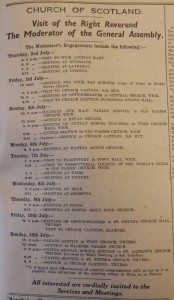
The Moderator of the General Assembly of the Church of Scotland was coming to Caithness in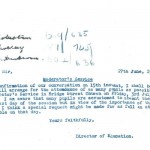 July, and was going to hold a “service for Wick day schools (close of term)” at Bridge Street Church on 3 July. Ian McHardy, Director of Education, wrote on 27 June to the head teachers of the schools concerned to make sure their pupils turned up: “I am aware that many pupils are accustomed to absent themselves on the last day of the session but in view of the importance of the occasion I think a special request might be made for as full an attendance as possible.”
July, and was going to hold a “service for Wick day schools (close of term)” at Bridge Street Church on 3 July. Ian McHardy, Director of Education, wrote on 27 June to the head teachers of the schools concerned to make sure their pupils turned up: “I am aware that many pupils are accustomed to absent themselves on the last day of the session but in view of the importance of the occasion I think a special request might be made for as full an attendance as possible.”
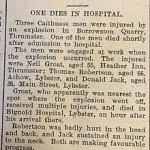
The John O’Groat Journal reported a tragic accident this week: “Three Caithness men were injured by an explosion in Borrowston Quarry, Thrumster. One of the men died shortly after admission to hospital. The men were engaged at work when the explosion occurred. The injured were Neil Groat, aged 55, Heather Inn, Thrumster; Thomas Robertson, aged 66, Achow, Lybster and Donald Jack, aged 36, Main Street, Lybster.” The men were taken to Bignold Hospital, which had been relocated to Lybster during the war, where Neil Groat died an hour later. It was believed that an old unexploded charge had been set off while the men were working.
The Wick Harbour Trust was considering the question of cured herrings, which was not now being done in Wick: 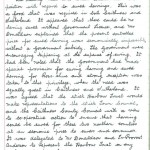 “It appeared that there could be no herring cured without Government Licence, and Mr Donaldson explained that the present controlled price for cured herring was economically impossible without a Government subsidy. The Government were encouraging kippering at the expense of curing. It had been noted that the Government had made special provision for curing herring and cured herring in for Ross-shire, and strong exception was taken to this privilege when the need was equally great in Caithness and Sutherland.”
“It appeared that there could be no herring cured without Government Licence, and Mr Donaldson explained that the present controlled price for cured herring was economically impossible without a Government subsidy. The Government were encouraging kippering at the expense of curing. It had been noted that the Government had made special provision for curing herring and cured herring in for Ross-shire, and strong exception was taken to this privilege when the need was equally great in Caithness and Sutherland.”
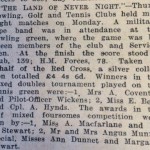 Finally this week, Thurso had celebrated the longest day on 21 June in traditional fashion, as the John O’Groat Journal reported, when the bowling, golf and tennis clubs “held midnight matches on Monday. A military pipe band was in attendance at the bowling green, where the game was between members of the club and servicemen. At the finish the score stood:- Club, 139; H.M. Forces, 78.” At this time of year the sun rises in Caithness at about 4.04 am, and sets around 22.27 pm.
Finally this week, Thurso had celebrated the longest day on 21 June in traditional fashion, as the John O’Groat Journal reported, when the bowling, golf and tennis clubs “held midnight matches on Monday. A military pipe band was in attendance at the bowling green, where the game was between members of the club and servicemen. At the finish the score stood:- Club, 139; H.M. Forces, 78.” At this time of year the sun rises in Caithness at about 4.04 am, and sets around 22.27 pm.
